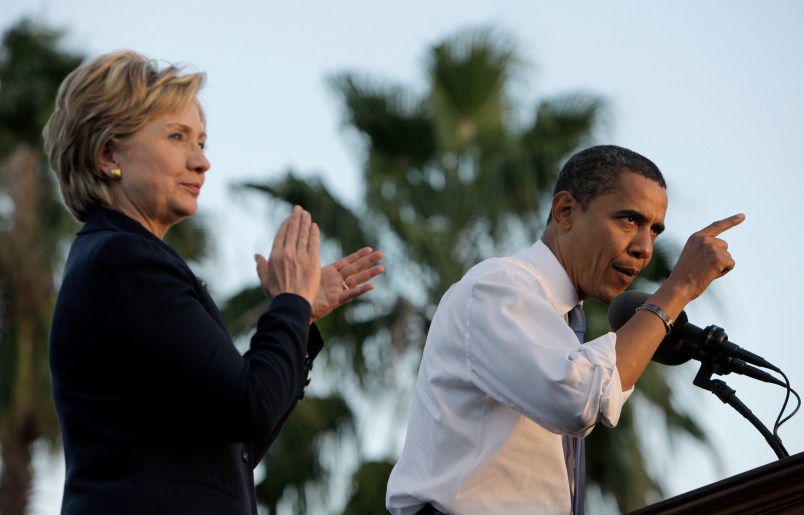Everybody is looking for distance between Hillary Clinton and Barack Obama. Every current political issue is run through her. Reporters are parsing her media appearances and recently released book for any arm-lengthening by Clinton from the current administration.
It’s going to be a real question for her campaign, should she decide to run. Republicans want to tie her to the most unpopular elements of the Obama White House, while Democrats remain fond of the 44th president. As the administration’s former secretary of state, the questions are inevitable and they will require a certain balancing act on Clinton’s part.
So what might she do to set herself apart? Veterans of two previous presidential campaigns that faced the same question offered TPM a guess: Hillary Clinton can say that she will, as one strategist put it, “get shit done.”
That was the operative phrase given by Carter Eskew, chief strategist from Al Gore’s 2000 presidential campaign.
“Here’s the thing I think works in her favor: What people think about her is she’s going to be a competent president. She’s going to be a strong leader,” he said. “She may not be as good on the issues, but she’ll get shit done… You can see a way that she becomes the perfect antidote to Obama.”
It sounds a lot like Clinton’s pitch from 2008. But the political environment in 2016 looks, at least for now, like it will be a lot different from what candidates confronted in 2008. Fairly or not, polling frequently finds that, while Obama is well-liked as a person, his political leadership is suspect. If anything, Clinton might have the opposite problem — but that could be an asset if voters feel like they need a change from the current administration. What was once a weakness could become a strength.
A snapshot of recent polling lends some weight to Eskew’s prescription. An NBC/WSJ poll on June 18 found that 54 percent of Americans believed that the president is no longer capable of leading the country and getting his job done. To contrast, a Washington Post poll showed that 67 percent of Americans think that Hillary is a strong leader.
But that apparent advantage doesn’t mean Clinton will simply resort to disparaging her former boss. Obama still holds a job approval rating upwards of 70 percent among Democrats. She needs to retain and build on that enthusiasm to cruise through the primary and hold onto the Obama coalition in a general election.
So toeing that line, paying due respect to Obama while playing up those perceived strengths among voters, seems like the most likely path for Clinton, said Charlie Black, a campaign adviser for President George H.W. Bush.
“Dogged is good” he told TPM. “She can make the case for her competence, which is the question right now that independent voters are asking about Obama.”
It could also be an effective image for her after years of partisan gridlock in Washington, in which many — rightly or wrongly — have seen Obama as unable to cut through political differences to achieve any substantive accomplishments since the GOP took the House in 2010.
“The question will be, ‘Here’s what he hasn’t been able to do, do you think you will be a more effective president or do you think it’s no longer possible in this partisan environment?” Eskew said. “I think, on the one hand, she thinks this partisan atmosphere is so fucking poisonous. But on the other hand, she might think, ‘Well, maybe I can build some of those bridges.'”
And to partake in some of that tea-leaf reading, it is possible to see Clinton testing that message already. Her new book is called “Hard Choices,” after all.
The Washington Post detailed six occasions where Clinton wrote about her disagreements from Obama in the memoir. Each time, she attempted to strike a tone that both underscored what she might have done differently without openly dismissing the president.
“No one likes to lose a debate, including me,” Clinton wrote in one particularly demonstrative passage on arming the Syrian rebels, which has gained renewed relevance during the ongoing Iraq crisis. “But this was the President’s call and I respected his deliberations and decision.”







If “getting shit done” means compromising away progressive positions just to get the RWNJ’s in the House to go along, then I’d rather have gridlock, thank you very much.
I could point to the fact that Obama has actually accomplished a significant more than Bill Clinton did in his 8 years, and really lay an emphasis o the Hillary’s Health Care issue. However, in honor of the DC press corps I think I will just ignore all facts and say ‘You go girl!’
Considering the republicans hate Hillary Clinton just as much as President Obama, I doubt any more shit will get done unless there is a dramatic power shift in congress.
You wouldn’t know it from listening to pundits but it’s not the president’s job to solve congress. Gridlock is the fault of 1) Boehner who refuses to hold votes on things even when they have majority support 2) Republicans, not just the Tea Party conservatives but also the few moderates who elect Boehner Speaker and give him the power to kowtow to the Tea Party and block votes, 3) the people who elect Republicans to congress or don’t turn out to vote against them 4) the media who misrepresents congress’s responsibility to “get shit done” as the president’s and confuses voters about who to blame.
The only thing that may get done is they might actually find something when investigating one of their ‘scandals’.